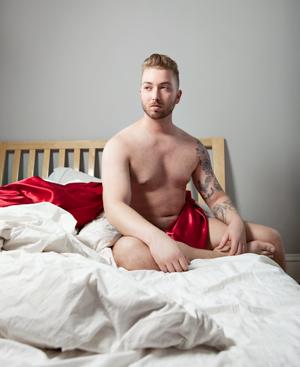There are a few simple facts about Michael Burtch: he is a student, a son, a brother, an activist — and he’s HIV-positive. Certainly Burtch would say that all these things have shaped him, but being diagnosed with HIV in his early 20s has propelled him to become the person he is today: a social-justice advocate, Xtra’s AIDS activist of the year and an outspoken critic of Canada’s HIV-nondisclosure laws.
Being gay, poz and out about it has also turned Burtch into a writer. He is a regular blogger on positivelite.com, an online outlet for people living with HIV.
In 2010 Burtch wrote a personal account of what it means to live as a sexually active poz man. It was a vivid piece that described how he had unprotected sex without disclosing his HIV status.
Burtch wrote about the “complexities and nuances of disclosure” from an HIV-positive guy’s perspective, refusing to simplify a complicated issue. He knew the topic was controversial, but he was unprepared for the torrent of negative comments that followed — he was labelled a murderer and chastised for telling the truth.
“I think that is bullshit. I really wanted to talk about what it’s like and how [the disclosure laws are] really used and how easy it is to fall victim to this kind of witch hunt that we have around criminalization,” he says. “If we are going to talk about stigma and we’re going to talk about criminalization, then we need people to stand up and talk about their experiences and own it.”
Burtch has continued to blog. Maybe he has become a little hardened, more mature, but being able to write openly about how HIV-nondisclosure laws have affected his life is cathartic.
“I have a good friend who has gone to jail, and I have seen the damage done in my community, not only in my poz community but in the queer community,” he says. “I was — and am — hoping that talking about the inadequacies in the law and the unfair burden that it puts on poz people [would help people] connect with the issue and hopefully come around to my way of thinking.”
Burtch has come out about his HIV status to the greater community, to his friends and to his family, but not everyone has understood; in fact, one of Burtch’s siblings refuses to speak to him.
“That has been difficult, trying to navigate personal privacy. Obviously, it is part of my story, my narrative, and it is relevant to the work that I do, so I talk about it,” he says. “But I also want to be respectful of the fact that, whatever my feelings, my sister, my family or my friends have a right to their privacy being respected, and they don’t necessarily need to be pulled into these discussions. So it’s a tightrope sometimes.”
Burtch works with an AIDS service organization doing community outreach and organizes magnet parties for poz guys and fundraisers for various charities, including cancer research and sex-worker rights.
He is also a member of the Ontario Working Group on HIV Non-Disclosure, which is constructing a map of community response and approaches to nondisclosure laws, trying to understand where people stand on the issue and how they are or are not supporting HIV nondisclosure.
On the personal front, Burtch is healthy. He looks after himself, is vain in the way that only gay boys can be, but he is not frivolous. He is acutely aware of how his life has been affected by HIV, but he is not willing to put himself in a corner and keep quiet about it. He is, quite simply, out, poz and proud.
“I am not ashamed. It fucking sucks, but if something good can come out of it, it’s this, that I can talk about the experience,” he says.

 Why you can trust Xtra
Why you can trust Xtra


